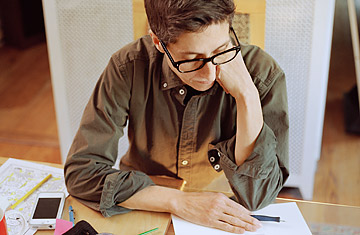
It's complicated. The best-selling author, at the University if Chicago for a residential fellowship, draws a picture of her mother.
As a child, Alison Bechdel was fascinated by the cartoons of Charles Addams. Not by their humor or even their macabre subject matter so much as their formal properties. "Even before I could read, I knew that there were words that went with the pictures," she says. "And even after I did learn to read, they didn't make any sense. I didn't understand them. There was this constant weird disjunction between the words and the pictures — and I found it really powerful and magical." She was an unusual child.
Now Bechdel is a cartoonist herself, and she hasn't gotten any less unusual: at 51 she's the creator of the comic strip Dykes to Watch Out For and the author of two memoirs in the form of graphic novels, Fun Home and her new book, Are You My Mother?, which is out in May. The lesson of those Addams cartoons has stayed with her. Pairing words and images that don't quite fit together has become part of her artistic voice.
For example, in one panel in Are You My Mother?, which borrows its title from the classic children's book, Bechdel paraphrases the Old Testament about the Day of Judgment, when the names of the wicked will be blotted out from the book of life. But what she shows us is a drawing of herself as a child, blotting out a word (we) she has just written in another book of life, her diary. "The register of the images and the register of the text create an overtone when they're combined, if you get it right," she says. "I like to push on that distance as much as I can."
In Bechdel's work that distance stands in for the gap between reality and appearance, meaning and symbol, what people think and what they say and do. In her family, that gap was alarmingly wide.
Bechdel's father died in 1980, when he was 44 and she was 19. His death may or may not have been a suicide: he was killed when he jumped, or appeared to jump, in front of a Sunbeam Bread truck. A couple of months before that, Bechdel had come out to her family as a lesbian. Shortly after his death, she learned that her father had led a double life as a gay man and that her mother had recently asked him for a divorce. It would not be a stretch to say that Bechdel grew up in a house of secrets.
It took her a long time to untangle or at least loosen those dark, knotted secrets enough to turn them into art. Fun Home, her graphic memoir about her father, was published in 2006, and it's one of the great memoirs of the new millennium. A highly literary, intricately structured work, it was a finalist for a National Book Critics Circle Award and tells not only her father's story — the title is a reference to his curious sideline as a funeral-home director — but also the story of Bechdel's struggles with anxiety and paralyzing self-consciousness and her gradual awakening as a lesbian and as an artist. Now, six years later, Bechdel is continuing the story with a book about her relationship with her mother.
A small, slender, intense woman with short dark hair, Bechdel is a rapid and precise talker given to annotating and correcting and even reproaching herself as she goes. She seems to be almost painfully aware of how words skate over and around truth, never having quite enough nuance to grasp it completely. "For me, writing these stories about my actual life is a way of imbuing them with meaning," she says. And she quickly adds, "Even though I know that rationally my life is completely meaningless. It gives me pleasure to find meaning in it."
